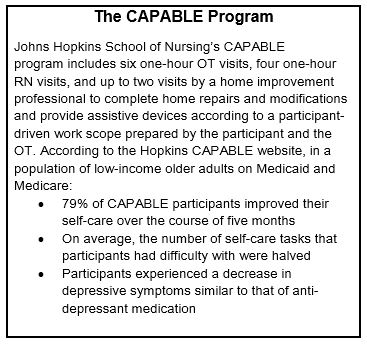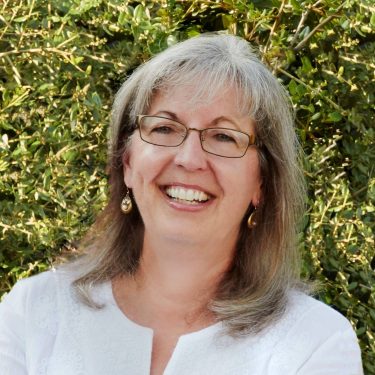Helping Older Adults to Age Gracefully in Place
by Jill Breysse
When my mom was in her early seventies, her health began to decline. It seemed like she had appointments with different specialists every other day: endocrinologist, cardiologist, ophthalmologist, podiatrist, dentist, general physician, et cetera, et cetera. I don’t know if she talked to a doctor about her increasing physical weakness, but there didn’t seem to be an appointment for this problem, which rapidly and distressingly worsened. She went from walking on her own to a cane and to a walker, and her frailty sometimes caused her to fall in her own (admittedly cluttered) home. Luckily, these falls did not often land her in the ER; however, they were scary and debilitating, and she became more and more reluctant to venture outside her home, finally no longer even walking to the end of her own short driveway to pick up her mail.
This rather unremarkable story is surely familiar. Frailty, falls, and fear are all too often perceived as a “normal” part of aging. Older adults – particularly those living on a fixed income and dealing with adverse health conditions – may not be able to adequately maintain their homes or move safely within those homes, making falls and unplanned hospitalizations a distinct hazard. Low-income adults are particularly vulnerable to this scenario because they may have even less money and little or no access to needed healthcare. NCHH’s new Aging Gracefully in Place study hopes to demonstrate that this story does not have to be the norm for older adults.
NCHH is collaborating with Johns Hopkins School of Nursing (Hopkins) and organizations in four communities around the country to evaluate the replicability of Hopkins’ “Community Aging in Place – Advancing Better Living for Elders” (CAPABLE) intervention program.1 Hopkins’ CAPABLE program is a client-centered, home-based, unified set of interventions utilizing an occupational therapist (OT), a registered nurse (RN), and a home improvement professional (see text box) to increase older adults’ mobility and physical function so they can more safely age in place and move more independently both inside and outside their homes.
Archstone Foundation and the Harry and Jeanette Weinberg Foundation are funding the CAPABLE interventions, and the U.S. Department of Housing and Urban Development’s (HUD) Office of Policy Development and Research (PD&R) is funding an evaluation to determine whether the Hopkins’ CAPABLE program improves low-income elders’ physical function and decreases home safety hazards both immediately after CAPABLE interventions are completed and one year after they began.

The three-year Aging Gracefully project is helping these organizations help 142 low-income elders in their communities remain safely in their cherished homes as long as possible. Without a doubt, my mom would have been happier if a program like CAPABLE could have helped her to move confidently in and around the home she’d lived in for almost 50 years.Through this formative evaluation, Aging Gracefully is also fostering a learning community among the following four diverse partners to see if Hopkins’ CAPABLE program can be replicated in their communities and to document vital information needed to scale up and sustain the CAPABLE program across the country:
- In Greensboro, NC, construction specialists from Community Housing Solutions of Guilford, Inc., a nonprofit organization whose mission is to “provide decent, safe, and affordable housing to low-income households,” have teamed up with OTs and RNs from Cone Health, one of the region’s largest health networks.
- Catholic Social Services of the Diocese of Scranton (Wyoming Valley office, Wilkes-Barre, PA), whose social programs assist in “strengthening family life and helping individuals reach their full potential,” have teamed with OTs and RNs from Allied Services, a leading provider of healthcare for northeastern Pennsylvania, along with home-repair workers from public and private organizations. The Area Agency on Aging for Luzerne and Wyoming Counties is also helping identify and collect study evaluation data for seniors in both public and private housing.
- Vermont’s project team includes both nursing and home repair staff from Cathedral Square Corporation, Inc., a nonprofit developer of “affordable, service-enriched housing communities for seniors and individuals with special needs,” with OT staff from the University of Vermont Medical Center.
- The Family Health Centers of San Diego, a healthcare organization with a “special commitment to the uninsured, low-income, and medically underserved,” will fill out their team with home improvement professionals from Rebuilding Together San Diego and subcontracts with OTs.
The CAPABLE program has already shown promise in Baltimore, MD (see text box above). The hope is that CAPABLE and other similar programs will ultimately fit within larger efforts, such as the “Well-Home Network.” In collaboration with LeadingAge and Families USA, NCHH is working on a plan to design and implement this national network of housing-based service models (HBSMs) at affordable nonprofit housing organizations to ensure that low-income older adults age successfully in their communities by helping them to achieve better health, well-being, and social engagement while also reducing Medicare and Medicaid costs.
COMMENT: What’s your story? NCHH wants to hear from you. Tell us how a program in your area has or could have benefited your aging parents or relatives. Leave your comment on our Facebook page, or tell your story here.
_______________
1©2015 Johns Hopkins University. All rights reserved.
 Jill Breysse, CIH, MHS, Project Manager, joined NCHH in 1998. During her time with the organization, Ms. Breysse authored several peer-reviewed research articles evaluating healthy homes hazard assessment tools and interventions; was the lead author of guidance on conducting health impact assessments for housing decisions; helped to develop the National Healthy Homes Standard, an evidence-based standard of care for existing owner-occupied and rental housing; and served as the project manager for several healthy homes projects related to older adults, such as Aging Gracefully in Place, which aimed to improve elderly residents’ physical function and enhance their housing conditions so that they can safely age in their existing homes. Ms. Breysse holds a Master of Health Science in environmental health engineering from the Johns Hopkins Bloomberg School of Public Health and a Bachelor of Science in chemistry from the University of Maryland. Ms. Breysse retired in February 2024 after 25 years with NCHH.
Jill Breysse, CIH, MHS, Project Manager, joined NCHH in 1998. During her time with the organization, Ms. Breysse authored several peer-reviewed research articles evaluating healthy homes hazard assessment tools and interventions; was the lead author of guidance on conducting health impact assessments for housing decisions; helped to develop the National Healthy Homes Standard, an evidence-based standard of care for existing owner-occupied and rental housing; and served as the project manager for several healthy homes projects related to older adults, such as Aging Gracefully in Place, which aimed to improve elderly residents’ physical function and enhance their housing conditions so that they can safely age in their existing homes. Ms. Breysse holds a Master of Health Science in environmental health engineering from the Johns Hopkins Bloomberg School of Public Health and a Bachelor of Science in chemistry from the University of Maryland. Ms. Breysse retired in February 2024 after 25 years with NCHH.
Latest page update: February 22, 2024 (bio only).
